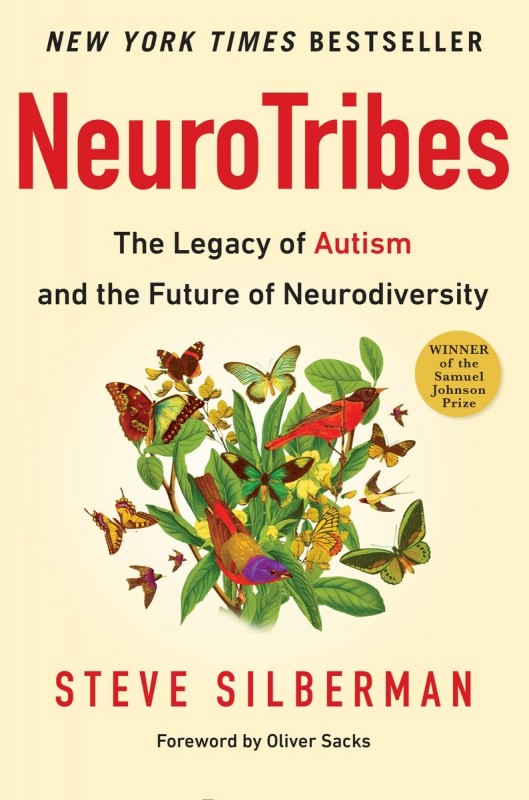Keck Neuroscience Lecture: 6 p.m. Thursday, March 24; PLUS: Neuroscience research public showcase: 4–5:45 p.m. Monday, Feb. 22
TACOMA, Wash. – “What is autism? A lifelong disability or a naturally occurring form of cognitive difference akin to certain forms of genius?”
Thus begins the publicity note for the 2015 book, NeuroTribes: The Legacy of Autism and the Future of Neurodiversity, by science writer Steve Silberman. The book became an intercontinental best-seller and made the “Best Books of 2015” list of The New York Times, The Economist, Financial Times, The Boston Globe, and other publications.
On March 24, Tacoma audiences can hear from Silberman about NeuroTribes and learn about the growing movement of “neurodiversity” activists, who see autism as a natural and celebrated human difference—a disability, rather than a disease or disorder of modern times.
Silberman will deliver the Keck Neuroscience Lecture on Thursday, March 24, from 6 p.m. to 7:30 p.m., including time for questions from the audience. The free event will be in the Tahoma Room, Commencement Hall. No tickets are required, and everyone is welcome. A map of the campus is below.
Ahead of the lecture, on Feb. 22, the public is invited to the Sound Neuroscience Symposium, which will honor Marvin Caruthers, nationally acclaimed scientist and distinguished professor at the University of Colorado Boulder, who created the endowed chair for the University of Puget Sound’s neuroscience program in honor of his wife.
The symposium will showcase student and faculty neuroscience research in the Tahoma Room, Commencement Hall, 4–5:45 p.m. Monday, Feb. 22. Caruthers, who has been honored with numerous prestigious awards for his breakthrough work in DNA synthesis and sequencing, will give a short talk. Siddharth Ramakrishnan, the Jennie M. Caruthers Chair in Neuroscience at Puget Sound, will speak about his research at Puget Sound and visions for the neuroscience program and its community outreach.
Silberman’s March lecture will reveal some of the secret histories of autism, which he says was long suppressed by the same clinicians who became famous for discovering it. The WIRED magazine reporter also will give his assessment of why the number of diagnoses of autism has soared in recent years.
Silberman’s book, which won the 2015 Samuel Johnson Prize for Non-Fiction, uncovers the story of Hans Asperger, whose “little professors” were targeted by Nazi social engineers. It claims to expose a covert campaign by child psychiatrist Leo Kanner to suppress the autism spectrum's knowledge for 50 years. It spotlights a new movement of activists who seek respect, workplace and educational accommodations, and the right to self-determination for those with cognitive differences.
The San Francisco Chronicle said of the book: “To read NeuroTribes is to realize how much autistic people have enriched the scope of human knowledge and diversity, and how impoverished the world would be without them.”
“Epic and often shocking,” wrote the Chicago Tribune. “A rallying call to respect difference,” said Science magazine.
Steve Silberman is an award-winning science writer whose articles have appeared in WIRED, The New Yorker, Nature, Salon, and many other publications. Silberman’s TED talk, “The Forgotten History of Autism,” has been viewed more than a million times and translated into 25 languages. His article, “The Placebo Problem,” won the 2010 Science Journalism Award for magazine writing from the American Association for the Advancement of Science and was featured on The Colbert Report. His writing on science, culture, and literature have appeared in major anthologies, including The Best American Science Writing and The Best Business Stories of the Year.
The lecture is made possible by the W.M. Keck Foundation, which supported the creation of the University of Puget Sound’s Keck Initiative for NeuroCulture. The campus initiative aims to broaden knowledge about neuroscience through research and interdisciplinary study opportunities, and public seminars and exhibitions.
For directions and a map of the University of Puget Sound campus: pugetsound.edu/directions
For accessibility information, please contact accessibility@pugetsound.edu or 253.879.3236, or visit pugetsound.edu/accessibility.
Press photos of Steve Silberman can be downloaded from pugetsound.edu/pressphotos.
Photos on page: From top right: Neurotribes book cover; Steve Silberman, by Keith Karraker; Siddharth Ramakrishnan in the laboratory, by Ross Mulhausen
Tweet this: Hear @stevesilberman on #autism from his #NeuroTribes book @univpugetsound, Th Mar 24 Free #Tacoma http://bit.ly/1D2ZzWS
Follow us on Twitter! twitter.com/univpugetsound


